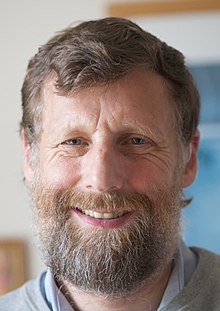Alastair McIntosh | |
|---|---|
 Alastair McIntosh, in 2010. | |
| Born | 1955 (age 69–70) |
| Education | Universities of Aberdeen (BSc), Edinburgh (MBA), Ulster (PhD) |
| Occupation(s) | Writer, academic and activist |
| Spouse | Vérène Nicolas |
Alastair McIntosh is a Scottish writer, academic and activist.
Contents
He was brought up in Leurbost on the Isle of Lewis and is married to Vérène Nicolas. He is involved with Scottish land reform especially on Eigg and campaigned successfully against the Harris superquarry in Lingerbay. He is a fellow of the Centre for Human Ecology, an Honorary Fellow of the Schumacher Society, and helped to set up the Govan based GalGael Trust of which he is Treasurer and a non-executive director. In 2006 he was appointed to the honorary position of Visiting Professor of Human Ecology at the University of Strathclyde (Department of Geography & Sociology) [1] – the first such post in Human ecology in a Scottish university.
Alastair also features on Nizlopi's mini album 'Extraordinary' on the track titled 'Homage To Young Men'. [2]